- Home
- Nathan Lowell
Double Share: Solar Clipper Trader Tales Page 4
Double Share: Solar Clipper Trader Tales Read online
Page 4
Theoretically, he was here in the Diurnia quadrant. At least that’s where Mother had always said we’d left him. Looking at the official Diurnian documentations of marriage and divorce, that seemed the most likely scenario. I wondered if he were still alive. I paged through the thin packet once more, looking for anything that might provide a clue as to his whereabouts. On a whim, I fired up the tablet and looked up Franklin P. Wang in the local data repository.
No hits.
I looked up Franklin Wang and got no hits.
That didn’t mean much. He could have changed his name or just removed it from the public directories. After twenty-odd stanyers, the trail was rather cold. I took one more long look and shrugged. Without his id number, any investigation would hinge on luck, and I’d used a lot of that up in the last few stanyers. I sighed and stuffed everything back into the zippered pouch and stowed it in the bottom of my trunk.
The message icon on my tablet acknowledged the receipt of my note to Diurnia Salvage and Transport, but didn’t offer to ship me out any earlier, so I headed for the Oh-two Deck. I was ready for some lunch, a beer, and maybe I could find out something about my new employer.
The main deck of any station is the dock. Decks above the docks have increasing numbers—One Deck, Two Deck, Three Deck, and so on. My hotel was on the Seven Deck. By convention decks below the main deck are prefixed with a zero. Where Deck One is the level above the dock, the Zero-one Deck—or Oh-one Deck—is one deck below. Above the dock are all the retail, administration, and residential areas. Below the dock are all the industrial sections. Ship chandlers, cargo brokers, and other ship services facilities are on the Oh-one Deck, but below that is the entertainment section. The Oh-two Deck is where ships’ crews got together to engage in activities that are not talked about in polite company. Bars, brothels, tattoo parlors, and a variety of entertainments are available for those who have the interest and the credits necessary. One thing I’d found on every Oh-two Deck was a quiet pub where the brew was generally local and good, the food was plentiful and tasty, and neither would leave gaping wounds in my credit balance.
On Diurnia Orbital the place was called The Miller Moth and in addition to the obligatory sedate crystal display sign with the name, there was a stylized moth wing painted on the wall. Inside was the laminate and leather I’d been hoping for. Booths lined the walls and tables stood in shoals across the area between bar and wall. I knew that there would be a small dance floor on the side I couldn’t see from the door, and that most nights, the place would be full of people who were really just looking to sit, chat, and perhaps leave with somebody who might warm them against the cold of the Deep Dark. The big dance club would be almost diametrically across the station from this one, on the other side of the Oh-two Deck. The serious meat market action happened there, but it was probably too early in the station’s duty cycle to be busy at the moment.
I glanced around the place as I crossed from door to bar. A few people sat here and there around the room. It was a twenty-four stan business, so somebody was always arriving or leaving on an odd schedule that didn’t match the station’s. A couple of engineering ratings were holding down one end of the bar muttering quietly to each other over beers and burgers. I slipped onto a stool about mid-bar and the barkeep—a broad-shouldered woman with hands that dwarfed a pint glass—smiled as I settled in.
“Hiya, sailor. New in town?” she asked with a lopsided smile.
I laughed. “Yeah, just made port this morning.”
She held out one of those large hands and said, “Welcome to Diurnia Orbital. I’m Jen. What can I get cha?”
“Thanks,” I said, shaking the offered hand. “I’m Ishmael. Can I have something light on the beer front and one of those burgers?” I asked, nodding my head in the direction of the engineers at the end of the bar.
She bobbed her head in a small nod of acknowledgment. We dickered over the various conditions, condiments, and accompaniments. In what seemed like just moments, I had a cold beer and a hot burger commanding all my attention.
The barkeep hovered, just out of direct line of sight, and generally kept out of the way. Neither the engineers nor I were terribly demanding. She puttered about—straightening glassware, polishing the gleaming bar. Nothing planet shattering, but all aimed at having the optimal setting for the customers. She moved with the practiced efficiency of a pro.
“So what brings you to our fair orbital?” she asked after my initial engagement with the burger was successfully underway.
“I just graduated from the academy. Diurnia Salvage and Transport offered me a berth.”
“You came all the way from Port Newmar?”
“Yup, not a bad trip. Came on a fast-packet.”
We passed a pleasant stan of minor chit-chat while I ate and had a second beer. It was early in the day for me, but with nothing to do, and nowhere to go for a couple of days, it seemed a good way to pass the time.
Eventually I thumbed the tab, adding a nice gratuity. I’d be coming back often, so I wanted to leave a good impression. Besides, she was kinda cute.
CHAPTER SIX
DIURNIA ORBITAL
2358-JULY-5
Other than sleeping, eating, and exploring Diurnia Orbital, I didn’t have a lot to do. While I waited I reviewed all the publicly accessible information that I could find on Diurnia Salvage and Transport.
Even before I’d accepted the offer back at the academy, I’d done some homework on them. DST was a smallish concern based on Diurnia. They started out doing salvage work and bulk transport contracts for the Confederated Planets when the CP was developing across the quadrant. The current CEO was the grandson of the founder, a man named Geoffrey Maloney. The database reported a fleet of about a dozen ships, all specializing in bulk freight. A third of them were tankers and the rest were bulk ore and grain haulers.
I took advantage of the StationNet access to pull up the local broker reports to see what DST was hauling and where. The list wasn’t terribly long. Of course, when you’re talking about a dozen ships, and transit times are two or three months, there aren’t that many trips in a stanyer. The sailing plans were all to or from the same four systems—Dree, Breakall, Welliver, and Jett. Besides Diurnia itself, Dree was the only confederated planet in the bunch. The rest were corporate systems. The Diurnia quadrant was one of the original beads on the string that became the Western Annex. There were a lot of corporate systems out there. It was unusual to have two CP systems adjacent to each other—usually they liked to split up the influence. I dug into a few of the manifests but they were all common cargoes—grain, ores, raw metal, lumber, frozen food, and the occasional load of machine parts or farm equipment.
The ’Net brought up a list of the actual hulls. Only two of those were the newer Unwin Bar Bell two hundred metric kiloton bulk haulers, but mostly they ran older model Damien tractors and the venerable Manchester one hundred eighty metric kilo tons tankers. While the Manchester-built ships would be relatively comfortable, the Damien tractors were built for minimum crews. They were notorious for being long on work, short on crew, and uncomfortable on long trips. The Bar Bells were relatively modern but definitely built for power and not comfort. Their big drawing card was the single pod cargo container, big enough to hold small ships inside them. They could be loaded in advance, stacked together, and even left in orbit. The containers were particularly valued for security reasons, because they were not accessible from inside the ship. The only way into a bulk container is through the cargo loading ports on either end. When mated with its ship, the ports weren’t even available. The end nacelles of the hull blocked access. Loaded, mated, and security bonded, the Unwin Bar Bells provided as secure a transport medium as possible.
As I finished dressing for my interview with the DST people, I wondered what I’d run into. My appointment was for 09:00 in their corporate offices on the Oh-five Deck. Yes, I was nervous. I had to admit that to myself as I collected my tablet, made sure the room key was in
my pocket, and snagged my service cap on the way out the door. The butterflies only got worse while I waited for the lift and reached a peak just before I entered the beige and somewhat battered office space with the oval and star logo of Diurnia Salvage and Transport on the door. I took a deep breath, let it out slowly, and entered.
Inside the door was a dingy foyer. A counter ran almost the entire width of the space with a door against the far bulkhead to allow access behind the counter. A couple of chairs—looking plastically forlorn—waited for visitors in one corner, and a plastic tree lurked in the other. It wasn’t exactly what I was expecting, in terms of corporate office.
Behind the counter a clerk spoke into a voice headset hanging from his left ear. He looked up when I stepped in and smiled in greeting. He held up his index finger in a “hold on” gesture.
“Yes, sir, the Geordan VanTassle is due in later today. That container should be at the terminal in about…”—he consulted the clock on his monitor—“three stans and the ship is scheduled to dock by 18:00” He paused then, listening to something on the other end. “Yes, sir, thank you for calling DST. Please let me know if we can be of any further assistance.” He disconnected and crossed to the counter.
“Good morning, sar. Welcome to Diurnia Salvage and Transport. How can I help you?” he asked with a pleasant smile.
“Good morning. My name is Wang. I’m here about a third mate’s berth.”
“Of course, Mr. Wang, we’re expecting you.” He stuck his hand across the counter in an offered handshake. “Call me Bitters, with an ‘s’. While many might think me bitter, that’s not my name.”
He rattled it off in a well-practiced stream accompanied by a lopsided grin. While I shook the right, his left hand pressed a button under the counter, and the door on the end buzzed.
“Come on back, and we’ll get this going.”
I walked through the door and Bitters took me into the inner sanctum. He stuck his head into an inner office and said, “Mr. Nelson, Ishmael Wang is here.”
“Thank you, Bitters. Please show him in,” came a voice from the open door.
Bitters stepped out of the way and swept an open hand palm up toward the door. “Mr. Nelson will see you now.”
He had a funny sense of drama about him, and I smiled as I walked through the door to the cluttered cubby. There was barely room for the desk and two chairs in the cramped space. The man behind the narrow desk rose and didn’t have to reach far to extend his hand to me.
“Good morning, Mr. Wang,” he said warmly.
I shook the hand and murmured some greeting in return.
“Please have a seat.” He indicated the only chair on this side of the desk. “Let’s get this ship into space.”
In surprisingly short order I found myself trotted through the various forms, requirements, orientations, and associated minutiae which I hadn’t expected, but in hindsight, should have. He ran through the various contract clauses—all standard, which I recognized from my semester on legal practices—and summarized my pay and benefits—again, all standard. The pay was within norms. It wasn’t what anybody would call a “princely sum” but was still about two hundred credits a month above what I knew to be the average. It wasn’t a lot more, but certainly a welcome addition. In hindsight, I might have negotiated for more, but I was happy enough with the deal. I remembered that some of my classmates were still looking for berths when I left Port Newmar, so I felt fairly well disposed toward this one.
With the last of the administration work done, and the contracts thumbed and validated, Mr. Nelson rose once more and offered a hand in dismissal.
“You’ve got an appointment up at medical for your physical, and after that, you’re good to go, Mr. Wang. If you have no further questions…?” his voice trailed off.
“No, none,” I said, shaking his hand.
“Very well, then, assuming there’s nothing odd in the physical—and really—it’s just a formality for our insurance records, we’ll have you report to Captain Rossett on the William Tinker at dock nine in the morning.”
I was faintly surprised that a ship was docked and waiting for me but chalked it up to luck. At least I wouldn’t be on the hook for an expensive hotel room for an extended period.
The physical wasn’t something I had been looking forward to, but it was standard procedure for officers. With a resigned sigh, I headed up to the Two Deck and reported to the medical clinic. Two stans, four jabs, and a body scan later, I was free until morning. Even at that, most of the time consisted of waiting, and the majority of the questions were actually resolved by my academy health dossier. The clinician was pleasant enough but cool and remote. I supposed that “professional” was the proper adjective. She was certainly competent enough.
As I finished buttoning into my shirt once more, she reviewed the records and said, “Congratulations, Mr. Wang. There’s nothing in this workup that indicates any problem. I’ll forward a copy to DST and you’re good to go.”
I thanked her and headed out. That was it. I had a moment of jubilation in the passage outside medical, but trepidation seized me almost immediately. Who were these people I’d be serving with? How would I like them? Would they like me?
I squelched the feeling. They’d even warned us about it at the academy. I knew I’d cope, so I put it out of my mind and went looking for some lunch.
Jen was serving again at The Miller Moth down on the Oh-two Deck and I shared my good news with her.
“The Tinker?” she asked in confirmation. “You’re going onto the Tinker as third mate?”
“Yeah,” I told her around bites of a juicy burger slathered with fried onions.
She frowned in concentration but offered me congratulations on my berth. “I’m sure you’ll make a fine third mate,” she said but didn’t seem very enthusiastic.
“Is there something wrong with the Tinker?” I asked.
She shrugged and started polishing the bar. “Not that I know of, no,” she said with a peculiar emphasis on the “know” part.
“But?” I prompted.
“But ya hear things,” she said. “I don’t think it’s a happy ship, if you know what I mean.”
“Um, no. I’m not sure I do.”
She looked uncomfortable, chewing on her lower lip as if trying to make up her mind.
I gave her a moment or two to respond.
“The Tinker has gone through a lot of crew.” She looked up at me. “A lot,” she repeated with emphasis. “I don’t know how many for sure, but you’re the second third mate in less than a stanyer.”
I let that sink in for a bit while I considered it. Perhaps they were moving up and out.
“Does it strike you as odd that they imported you weeks ago for a berth that just opened up?” she asked.
“Well, I think it’s customary to give some notice,” I said. “Perhaps the current third is finishing out his contract?”
She looked dubious but shrugged in acceptance. “Possible, but that’s a short contract, less than a stanyer. How long is yours for?”
I considered that. “Two stanyers, but it’s a standard contract, and I can get out of it without a major penalty under some pretty normal conditions relating to health, performance, and such.”
She nodded, a wry smile turning up the left side of her mouth. “Most of the termination clauses are in the company’s favor, though, right?”
She had me there.
“Well, yeah, but even in my limited experience, it seems standard for the company to hold the better cards.”
“True,” she admitted in return. “Do you have a ‘probation’ clause?”
I sighed. “Yes, if we don’t like each other in the next three months, the contract can be terminated by either side.”
“Well, maybe that’s it. They’re just having trouble finding thirds that fit in.”
She didn’t sound convinced, but it was rather a dead-end conversation, and it was making me a bit uncomfortable, truth be told.
“How long you worked here?” I asked, steering the conversation onto a new course.
“Oh,”—she stopped wiping the bar and looked up at the overhead, thinking—“it’ll be three stanyers in a month.”
“You like it?”
She grinned and nodded. “Yeah, I do. Oh, I know it’s a bit of a cliché but it’s also rather exotic. I mean, I could wait tables planetside, but up here, we get people from all over the Western Annex dropping in.”
“Mostly ship people, isn’t it?” I asked.
She shrugged a little and said, “Well, yeah. This is the Oh-two Deck after all. Not many tourists come down here.”
“So, why don’t you work up above?” I asked glancing in the direction of the restaurants higher up on the orbital.
“Well, I used to. I like the clientele down here better. Working people seem to have more respect for working people.”
I chuckled a little at that. “Good to know.”
I drained my glass, thumbed the tab, and stood up from the bar.
“I’ll let ya know what I find out,” I said with a smile. “I report aboard tomorrow.”
She held out her hand over the bar. “Good luck, Ishmael,” she said warmly. “Hope I see you around soon.”
I shook her hand and if I held it a little longer than might have been necessary while she smiled at me, well, she didn’t pull back quickly either. A hail from the other end of the bar broke the moment and she shot me a shy smile as she turned to deal with her customers and I left The Miller Moth for my room.
CHAPTER SEVEN
DIURNIA ORBITAL
2358-JULY-6
Morning found me on the docks. My grav trunk trundled along behind me, and the receipt for my hotel stay had been stowed in my folio. The familiar bite of cold dock air mixed with the smell of stressed electronics and hydraulic fluid. I was looking for dock nine—the slot my tablet told me held the William Tinker, my new home in the Deep Dark.
I passed dock seven. The telltale said, Jo Alice Long. It wasn’t going to be the Lois. I knew that. I’d been on a lot of ships since the Lois. They were all different. My summer cruises had given me the opportunity to work on four different vessels and each had seemed okay. Of course, none had ever been more than a temporary billet. There was no real reason to put down roots, to form bonds and connections.

 By Darkness Forged (Seeker's Tales from the Golden Age of the Solar Clipper Book 3)
By Darkness Forged (Seeker's Tales from the Golden Age of the Solar Clipper Book 3)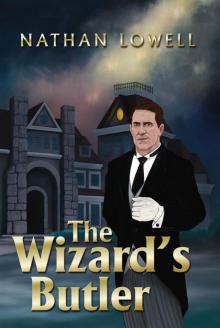 The Wizard's Butler
The Wizard's Butler Cape Grace
Cape Grace By Darkness Forged
By Darkness Forged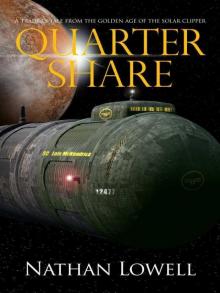 Quarter Share
Quarter Share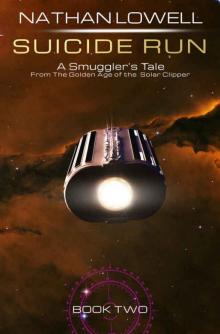 Suicide Run (Smuggler's Tales From the Golden Age of the Solar Clipper Book 2)
Suicide Run (Smuggler's Tales From the Golden Age of the Solar Clipper Book 2)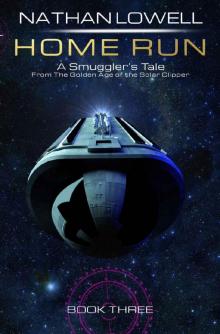 Home Run (Smuggler's Tales From the Golden Age of the Solar Clipper Book 3)
Home Run (Smuggler's Tales From the Golden Age of the Solar Clipper Book 3)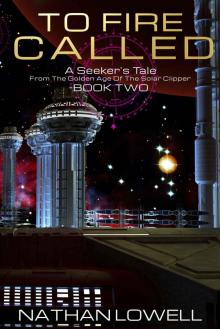 To Fire Called (A Seeker's Tale From The Golden Age Of The Solar Clipper Book 2)
To Fire Called (A Seeker's Tale From The Golden Age Of The Solar Clipper Book 2)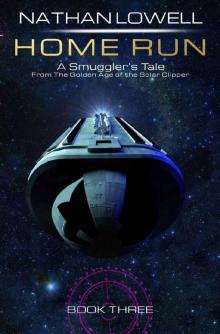 Home Run
Home Run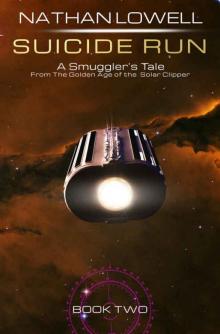 Suicide Run
Suicide Run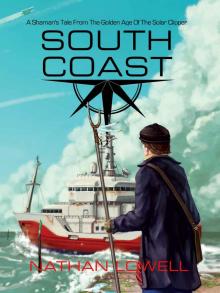 South Coast (Shaman's Tales From The Golden Age Of The Solar Clipper Book 1)
South Coast (Shaman's Tales From The Golden Age Of The Solar Clipper Book 1)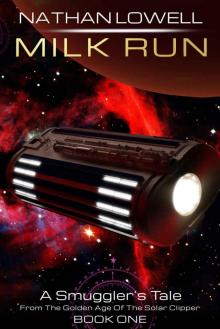 Milk Run (Smuggler's Tales From The Golden Age Of The Solar Clipper Book 1)
Milk Run (Smuggler's Tales From The Golden Age Of The Solar Clipper Book 1) Ravenwood (Tanyth Fairport Adventures)
Ravenwood (Tanyth Fairport Adventures) Captain's Share (Trader's Tales from the Golden Age of the Solar Clipper)
Captain's Share (Trader's Tales from the Golden Age of the Solar Clipper) Owner's Share (Trader's Tales from the Golden Age of the Solar Clipper)
Owner's Share (Trader's Tales from the Golden Age of the Solar Clipper)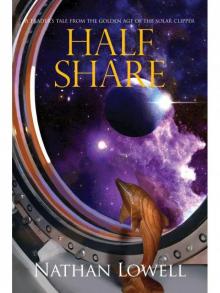 Half Share
Half Share The Hermit of Lammas Wood
The Hermit of Lammas Wood Ravenwood
Ravenwood Full Share
Full Share A Light In The Dark (Tales of the Deep Dark)
A Light In The Dark (Tales of the Deep Dark)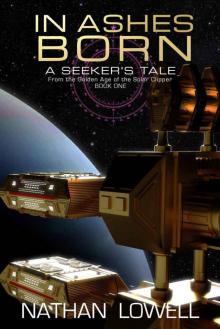 In Ashes Born (A Seeker's Tale From The Golden Age Of The Solar Clipper Book 1)
In Ashes Born (A Seeker's Tale From The Golden Age Of The Solar Clipper Book 1)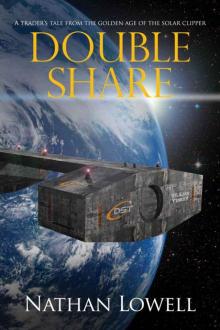 Double Share: Solar Clipper Trader Tales
Double Share: Solar Clipper Trader Tales Zypheria's Call (A Tanyth Fairport Adventure)
Zypheria's Call (A Tanyth Fairport Adventure)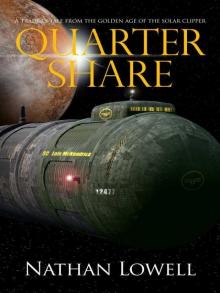 Quarter Share attftgaotsc-1
Quarter Share attftgaotsc-1